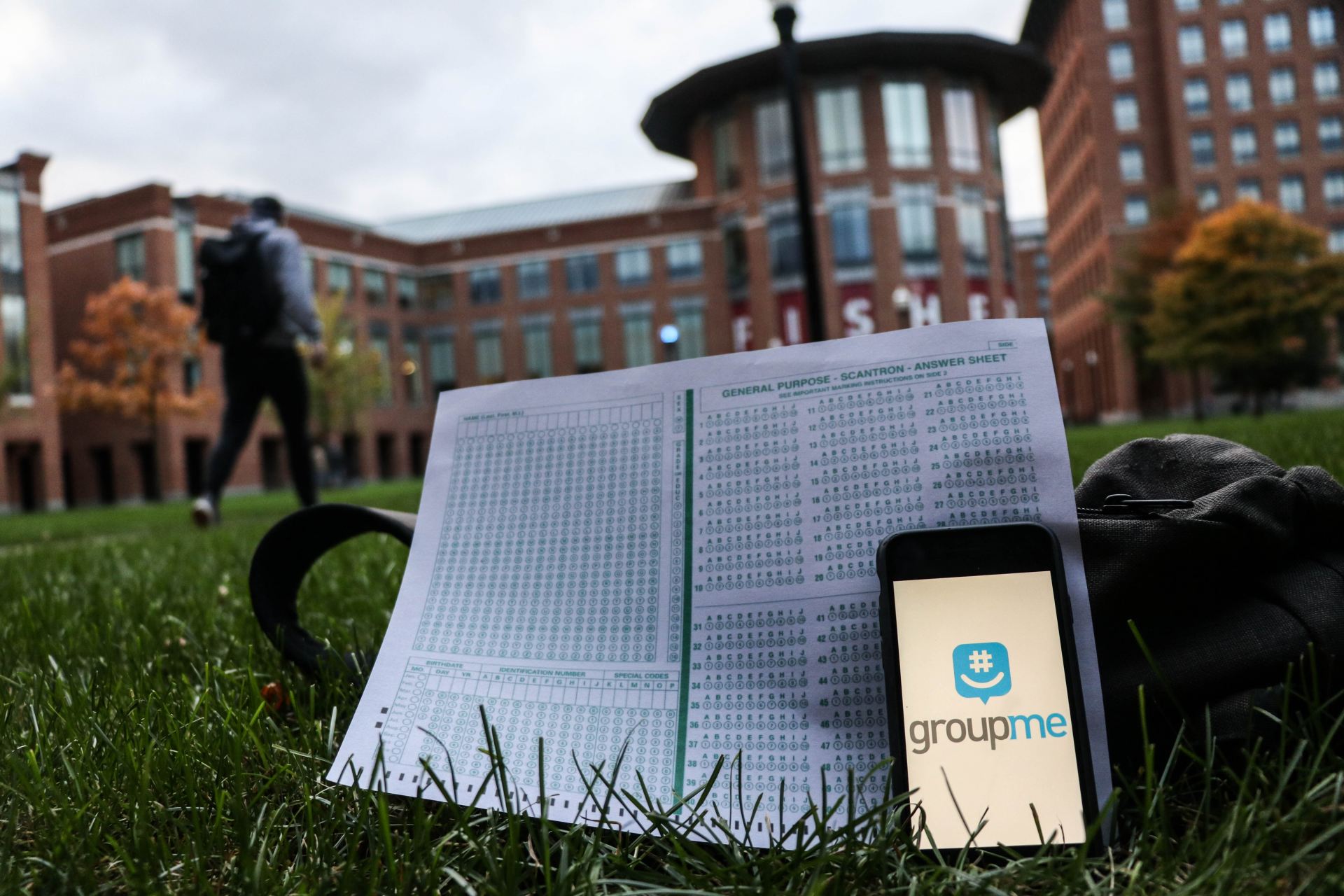
83 undergraduate students enrolled in a marketing course last spring were caught cheating using a messaging app called GroupMe. Credit: Jack Westerheide | Photo Editor
After caught sharing answers to course assignments in a messaging app called GroupMe last spring, 83 undergraduate students enrolled in a principles of marketing course were charged with violations of the student code of conduct, calling into question the ethics behind using technology to collaborate with classmates.
The Fisher College of Business students were reported by their professor in April, according to a statement from Ohio State spokesman Ben Johnson.
“The charges include unauthorized collaboration on graded assignments, which is prohibited under the Code of Student Conduct,” the statement reads.
Sanctions for group-cheating range from warnings to grade penalties and even dismissal from the major, college or university in extreme cases, according to the code of student conduct.
“Students charged with academic misconduct violations may accept responsibility for the charges or request a hearing before the Committee on Academic Misconduct pursuant to the Code of Student Conduct,” the statement read.
Students may also request a hearing before a panel of faculty and student representatives to determine if they are in violation of the code of student conduct.
“If found in violation, students receive sanctions based on the nature and severity of the violation in accordance with university standards and protocols,” the code states.
Depending on the outcome of individual cases and if they were ultimately found in violation or not, some students’ abilities to graduate on time could be impacted because of the curriculum requirements of Fisher.
The business college has specialty majors that each have their own set of core requirements, in addition to the general core classes that all Fisher students must pass in order to earn their degree.
GroupMe was used by students in a core marketing class for all specializations in the business school. The class is also a prerequisite class for two of the four core courses specific for marketing.
The class is also a prerequisite for Fisher students’ senior capstone courses. This means if a student is charged with a violation and penalized with either suspension or having to retake the class, it could affect their eligibility to graduate on time.
Disciplinary action could also pose problems for business students who shared answers in the prerequisite course if they were juniors and seniors. If they are suspended or required to retake the class, it could postpone when they are able to take the required electives needed for graduation.
Another group of students at Fisher that could be affected by the outcome are juniors and seniors in the human-resource specialization. If these students are penalized with suspension for the Spring Semester, they might have to wait until the next academic year’s Spring Semester, as some courses are only available during that part of the year.
While the integration of technology in classes at Ohio State is always changing, the code of student conduct remains the same.
Johnson said students are welcome to use social-media tools like GroupMe to communicate, but they must remember that the code of student conduct applies when they are communicating online just as it applies in the classroom.
“It’s not the social-media vehicle, whether it’s GroupMe or Facebook or a social-media platform or a learning platform that the university provides, it’s whether you’re sharing information that is allowable by the rules of the course or whether you’re sharing information that’s not allowable, and students just need to be aware of that,” Johnson said.
“In most cases, sharing the due date for a homework assignment is perfectly acceptable but sharing the answers to a final exam is not. Students should not share anything online that is prohibited by the rules for the course,” he said.
David Terry Paul, who has taught marketing at the Fisher College of Business for more than 30 years, said he has frequently experienced students cheating, but believes it is more common online because of things like online assignments and the flipped classroom approach.
The flipped classroom is a teaching method that has students learn new material outside of class — like watching lecture videos or having assigned readings — and doing what would typically be “homework” during class time to practice what was learned through activities such as problem-solving or discussion.
“When there are online assignments you know those aren’t monitored and obviously students can work together even though they’re not supposed to and that’s troubling and that’s really unfair, but I think as long as we have the flipped classroom and lots of online assignments it’s going to happen,” Paul said.
However, Paul said having a majority of what counts for the overall grade complete in class helps to keep the grading fair.
“A part of it for me is that the online assignments in my classes are a fairly small part of their grade,” Paul said. “The lion’s share of what counts for their grade is how they do in the classroom, in the exams, and I always have lots of monitors and we really are very vigilant during the exams. I think that’s the main part of the course and that’s where I concentrate in terms of trying to keep things legit.”
According to Ohio State’s code of student misconduct, “‘Academic misconduct’ is defined as ‘any activity that tends to compromise the academic integrity of the university or subvert the educational process.’”
Cases of misconduct range from deliberate acts of cheating to unintended missteps, in which students fail to distinguish their work from someone else’s.”
When an instructor suspects incidents of academic misconduct, they are required to report to COAM and a review panel of the committee will begin an investigation of the charges, decide whether a violation has happened and, if a student is charged with misconduct, the committee will determine the penalty, according the code of student misconduct.


